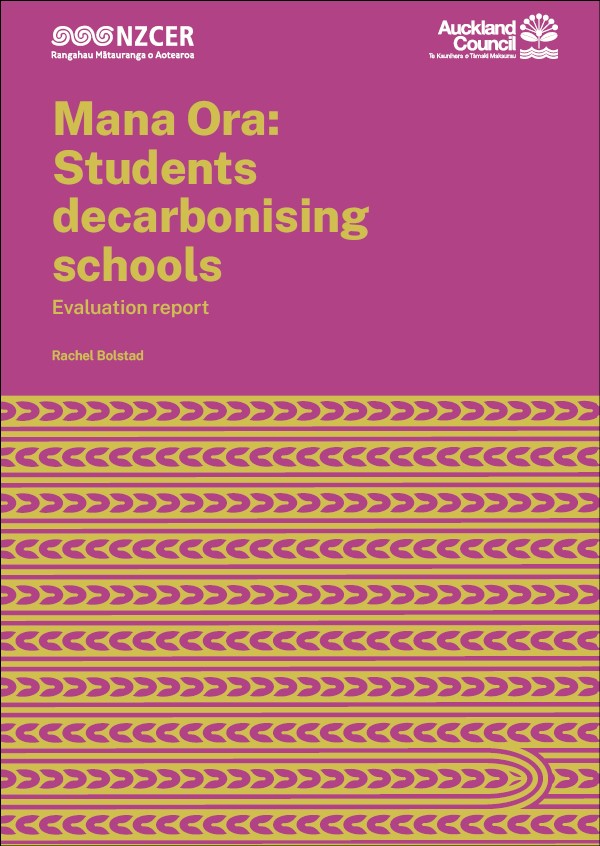Mana ora: students decarbonising schools. Evaluation report
Author:
Rachel Bolstad, New Zealand Council for Educational ResearchSource:
Auckland Council Sustainable Schools Team | New Zealand Council for Educational ResearchPublication date:
2024Topics:
PeopleOverview
The aim of Mana Ora: Students Decarbonising Schools was that students, with guidance and support from teachers and Auckland Council’s Sustainable Schools Team (SST), would plan and implement climate and sustainability action projects linked to decarbonisation within their schools. Mana Ora supported the projects through a pool of funding, on-demand support from SST advisors, and cluster gatherings to bring schools and kura together at key points across the project.
Students and teachers were encouraged to explore five theme areas to provide inspiration for their project ideas: transport, energy, waste, food, and grow. Eighteen Mana Ora projects were implemented in early childhood, primary, and secondary schools, 13 in English-medium, and five in Māori-medium contexts.
The evaluation findings indicate that Mana Ora succeeded in achieving most of its intended outcomes for students, teachers, and SST advisors, with some variability across projects and contexts.
Extract from the evaluation report.
Summary
In 2023, Auckland Council’s Sustainable Schools Team (SST) piloted a project called Mana Ora: Students Decarbonising Schools. The aim was that students, with guidance and support from teachers and SST, would plan and implement climate and sustainability action projects linked to decarbonisation within their schools.
Mana Ora supported the projects through a pool of funding, on-demand support from SST advisors, and cluster gatherings to bring schools and kura together at key points across the project. Students and teachers were encouraged to explore five theme areas to provide inspiration for their project ideas: transport, energy, waste, food, and grow.
Eighteen Mana Ora projects were implemented in early childhood, primary, and secondary schools, 13 in English-medium, and five in Māori-medium contexts. NZCER was engaged to evaluate the impact of Mana Ora in English-medium settings. Auckland Council established a separate Māori-led process to capture learning from Māori-medium Mana Ora projects.
In primary schools, projects were most often led by envirogroup students, supported by a teacher with an enviro/sustainability co-ordination role. In secondary schools, projects tended to be either led by senior students in sustainability leadership roles or were woven into subject-based classes. In two secondary schools, projects were described as more teacher led.
The evaluation explored the extent to which Mana Ora met its intended outcomes for students, teachers, schools, and SST advisors. It was beyond the scope of the evaluation to directly evaluate the emissions-reduction impacts of the projects, or the extent to which projects supported transfer of decarbonisation knowledge and practices into homes and the wider community. However, where possible, these outcomes were explored through interviews with students, teachers, and SST advisors.
The evaluation findings indicate that Mana Ora succeeded in achieving most of its intended outcomes for students, teachers, and SST advisors, with some variability across projects and contexts. ...
May 2024
See also
